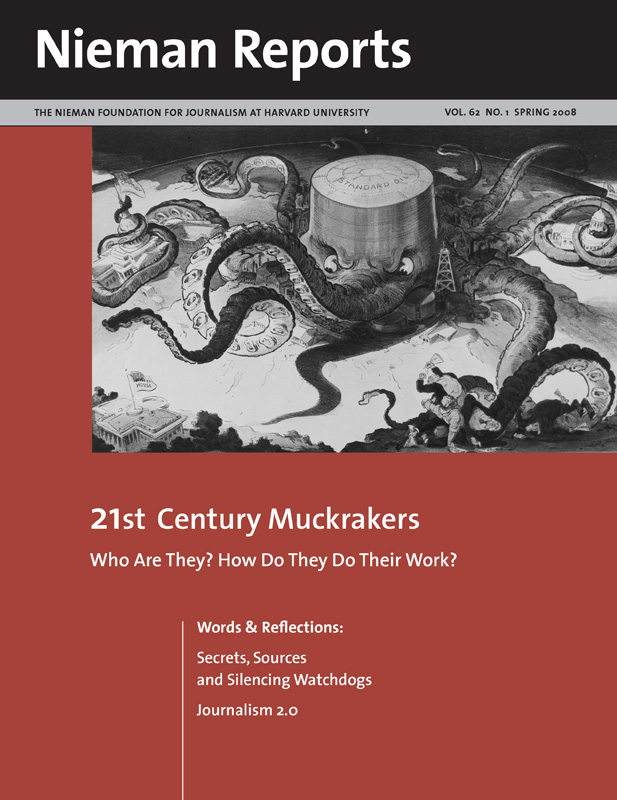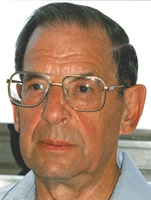he Bush administration will leave the White House with relations between the presidency and the press in shambles. No other president has set out so determinedly to discredit the role of the press as a watchdog on the transparency and accountability of government. Sadly, during the Bush presidency the American press sidestepped the administration’s hypocrisy of fighting a war to bring a free press to Iraq, while seeking to reduce its oxygen in the United States.
One of the first decisions President George W. Bush made was to issue an executive order tightening controls on the release of presidential and vice presidential records. To begin his presidency with secrecy as his priority was no accident. Bush was a neophyte in federal government, thrust totally unprepared into the role as “leader of the free world.” His vice president, Dick Cheney, however, had three decades to observe presidents close-up and had concluded that they had unwisely yielded power to others, thereby diminishing the presidency. Cheney took office as Bush’s mentor in Washington’s odd ways, determined to roll back what he construed as crippling inroads on presidential power.
Years before most of the press had any idea of the scope of Cheney’s reach behind the scene, he was the most powerful vice president in American history. Bush and Cheney, in the name of restoring power to the White House, had undercut the prime objective of the U.S. Constitution’s creators: to prevent the abuse of power. In the shock of two wars, in Afghanistan and Iraq, the Congress and press both defaulted as counterweights against the power grab.
The Sleeping Watchdog
Even before President Bush took office, the print and broadcast press corps in Washington, D.C. were far more advocates of watchdog reporting than they were performers of it. Congress similarly was often delinquent in its fundamental oversight role of maintaining checks on executive power. There is still little public understanding that the press and Congress have a symbiotic relationship. In fact, few editors realize that if they do not send reporters to cover hearings at the Capitol, there might not be hearings, because Congress survives on the publicity such coverage brings.
This interaction was underscored in the report of the special 9/11 commission on the terrorist attacks of September 11, 2001, which pointed out that, congressional committees “are often spurred into action by the work of investigative journalists and watchdog organizations.” The report ruefully added, “In recent years, traditional review of the administration of programs … has been replaced by ‘a focus on personal investigations, possible scandals, and issues designed to generate media attention.’”
As financial pressures have intensified on news organizations—with widespread cuts in staff and newsroom resources—both congressional and press scrutiny of the executive branch has been severely diminished. Even though there was already less press scrutiny due to the transformational times in which the press was operating, President Bush was obsessed from the beginning of his administration with what he regarded as unjustified intrusions by the press. Relief from what scrutiny existed came suddenly with national preoccupation over the 9/11 attacks, and those were soon followed by anthrax powder attacks on Capitol Hill. In political terms—with Republicans in control of both houses of Congress—these threats on public safety virtually immunized the Bush administration from criticism for the wars in Afghanistan and in Iraq.
During this time, the press remained the one potential counterweight that could have publicly explored what was later revealed to be grievous misjudgments in launching the Iraq invasion without preparation for its aftermath. But no attempt at watchdog reporting was made by a major news operation, with the exception of the excellent reporting done by the then-Knight Ridder Washington bureau. In general, it can be said that the press was actually in a supportive relationship with the Bush administration regarding the invasion of Iraq; subsequent to the invasion, The New York Times and The Washington Post published mea culpa explanations about their lack of aggressiveness in reporting on the lead-up to the war in Iraq.
The White House View
The Bush administration’s objective appeared not simply to contain or counter criticism from these quarters, but to blot it out. In April 2004, at a White House barbecue for the press, Ken Auletta of The New Yorker wrote, a reporter asked the president how he could know “what the public is thinking” if he did not read newspapers or watch the TV news, as he had earlier claimed. Without missing a beat, Bush replied, “You’re assuming that you represent the public. I don’t accept that.”
It soon became clear that Bush’s response was no fleeting barb. It clearly reflected a determination to obliterate the long-held assumption that in the United States a free press is a recognized watchdog agent for holding public officials accountable for their policies and actions and for demanding transparency of public records. Senior officials in the White House, including Chief of Staff Andrew Card, were authorized to explain to those who headed news organizations the challenge the Bush administration was putting forth: In essence, it was denying that the press has any check and balance role to play in the American system of government.
As press observer and New York University journalism professor Jay Rosen summarized the stand-off on April 25, 2004 on “PressThink,” his Weblog: “What the Bush people say is, ‘We don’t accept that you have a check and balance function. We think that you are in the game of ‘Gotcha.’ Oh, you’re interested in headlines, and you’re interested in conflict. You’re not interested in having a serious discussion … and exploring things.’”
Rosen went on to write that “generations of journalists have been taught to believe differently. Their sentences start like this, ‘In our system the press describes the role of journalism as a check on power, which is quasi-Constitutional only because another part of the Constitution, the First Amendment, says you can’t legislate the role of the press.…” Bush, Rosen continues, “rejects this idea. That theory has gone down,” he says. “And you guys don’t have that kind of muscle anymore.”
The Fourth Estate
Other sources disagree totally with the Bush White House on the Founders’ concept of the role of the press. In a 1974 speech, then-Supreme Court Justice Potter Stewart said that the “primary purpose” of the First Amendment was “to create a fourth institution outside the government as an additional check on the three official branches.” Stewart cited several landmark cases in which the Supreme Court had upheld the right of the press to function as a check on official power, including the 1971 Pentagon Papers case involving top secret papers on the Vietnam War initially published by The New York Times and The Washington Post. The high court struck down restraining orders—requested by the Nixon administration and issued by federal judges—which had stopped both of those presses.
In 1964, in New York Times Co. v. Sullivan, a libel case, Supreme Court Justice William J. Brennan delivered what still stands as the most sweeping interpretation of “the right to criticize government … [as] the central meaning of the First Amendment.” Brennan wrote that there is “a profound national commitment to the principle that debate on national public issues should be uninhibited, robust and wide open, and that it may well include vehement, caustic and sometimes unpleasantly sharp attacks on government and public officials.”
The most unexpected disagreement with President Bush about the press came from within his cabinet in 2007, from newly appointed Defense Secretary Robert M. Gates, who replaced controversial Donald Rumsfeld, who was a major influence in the decision to launch the Iraq War. Gates, who had served four presidents in high intelligence posts, had to be talked into leaving the leadership of Texas A&M University to take this job. He retained enough independence in the process to tell a U.S. Naval Academy graduating class that in devotion to freedom, “The press is not the enemy, and to treat it as such is self-defeating.” Gates urged the new graduates “to remember the importance of two pillars of our freedom under the Constitution: the Congress and the press. Both surely try our patience from time to time, but they are the surest guarantees of the liberty of the American people.”
Gates’s bold outspokenness coincided with evidence in parts of the nation of a growing turn against the Bush administration’s polarizing political strategy over the Iraq War. In the House of Representatives, in the earlier stages of the war, some had stooped to the lowest level of equating dissent with disloyalty. But in more recent times, instead of reinforcing the Bush administration’s demeaning of a watchdog press, an opposite effect has begun to emerge in some arenas with a surge of concern about the loss of watchdog reporting.
Now, arriving in the mix of new media outlets, comes the nonprofit journalistic venture called ProPublica, dedicated to investigative journalism (“reporting on abuses of power by anyone with power”) and supported with $l0 million-a-year financing pledged by philanthropists. With former Wall Street Journal Managing Editor Paul E. Steiger as its editor, the publication that will debut later this year will also be an experiment in transcending ideology, since the donors who make its existence possible are strongly anti-Bush. In addition to its Web site, ProPublica intends to offer “temporary exclusives” of its investigative reporting to “existing news platforms” that offer the best visibility for a particular story. Steiger has said that he felt impelled to act and innovate because “today, all around me is an industry in upheaval, with slumping revenues and stocks, layoffs and takeovers of publishers that a decade ago seemed impregnable ….”
An observer might add, what an irony it would be if President Bush’s attempt to shrink the influence of the press boomeranged into one reborn and more powerful than ever.
Murrey Marder, a 1950 Nieman Fellow, is a former chief diplomatic reporter with The Washington Post. He is also the sponsor of the Nieman Watchdog project (www.niemanwatchdog.org) through the creation of The Murrey and Frances Marder Fund at the Nieman Foundation.



